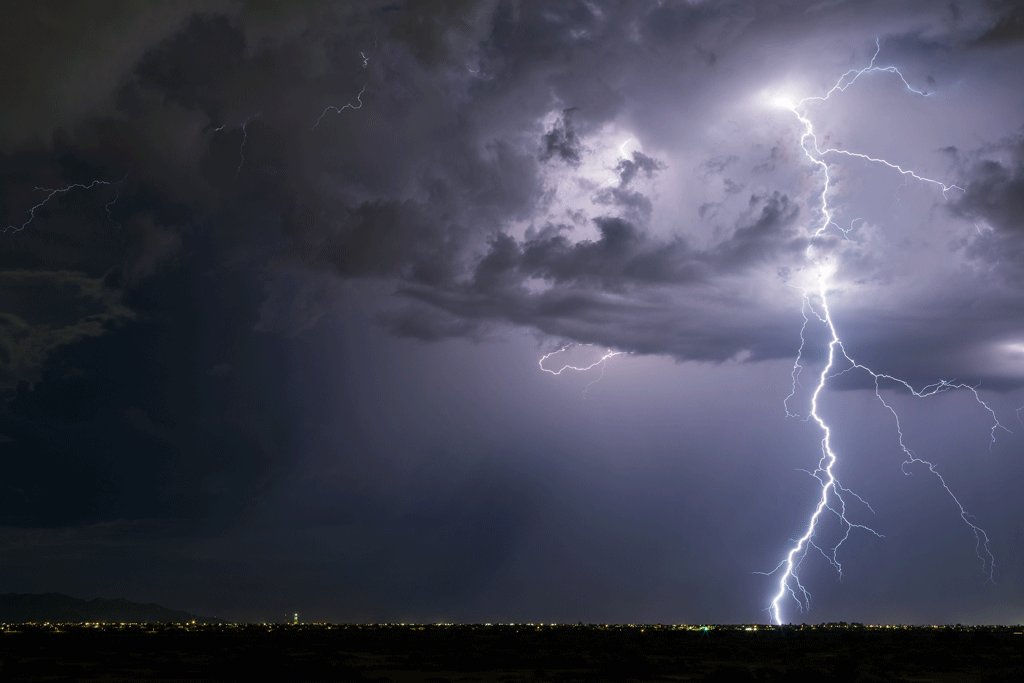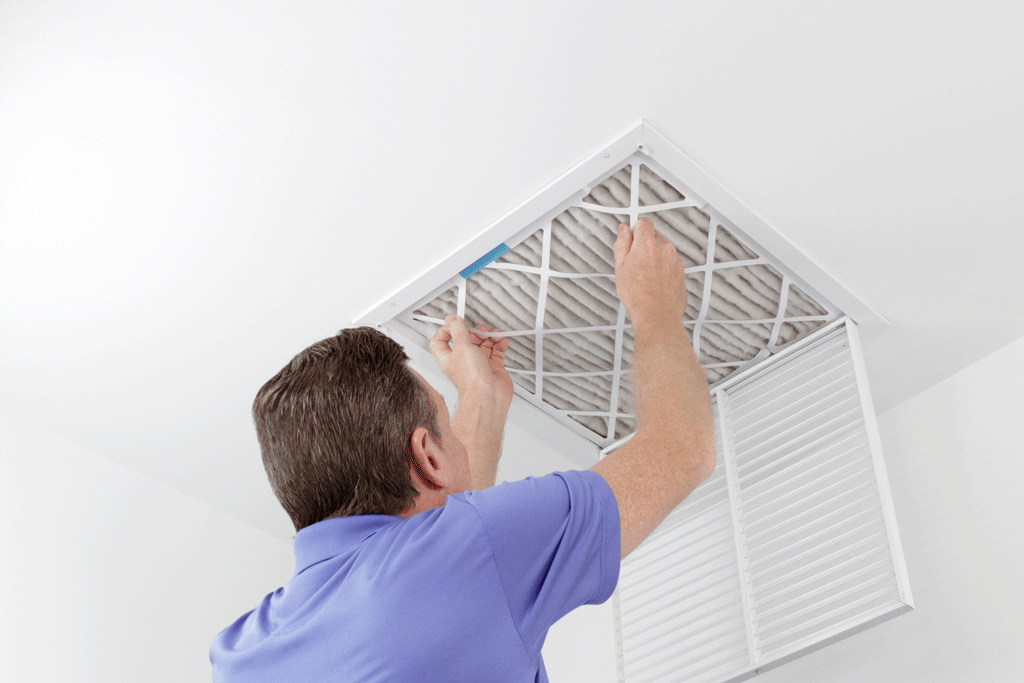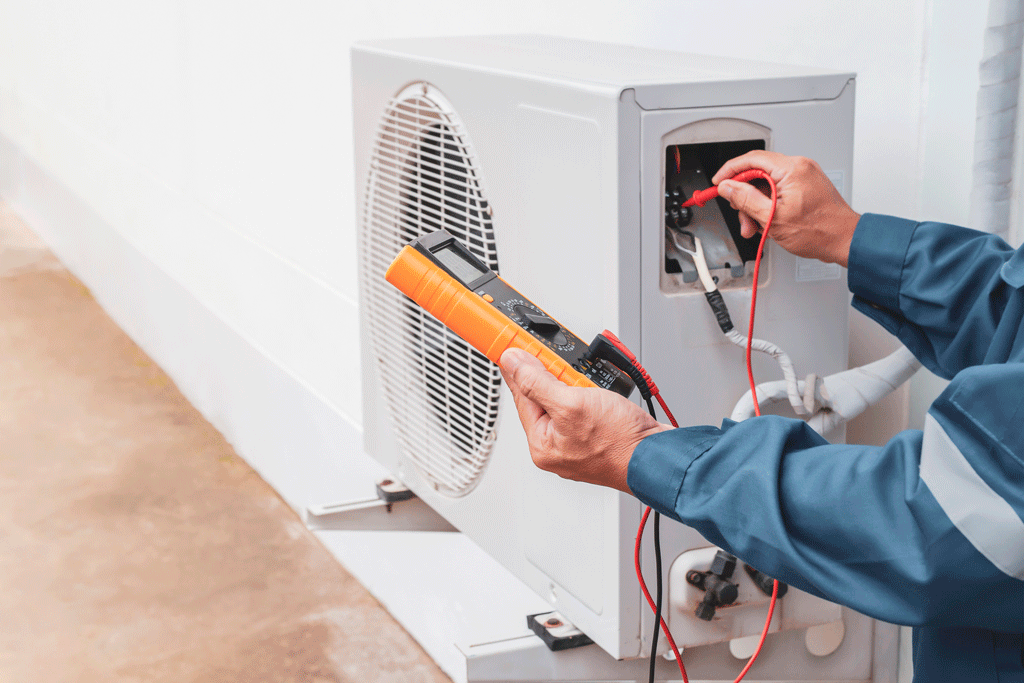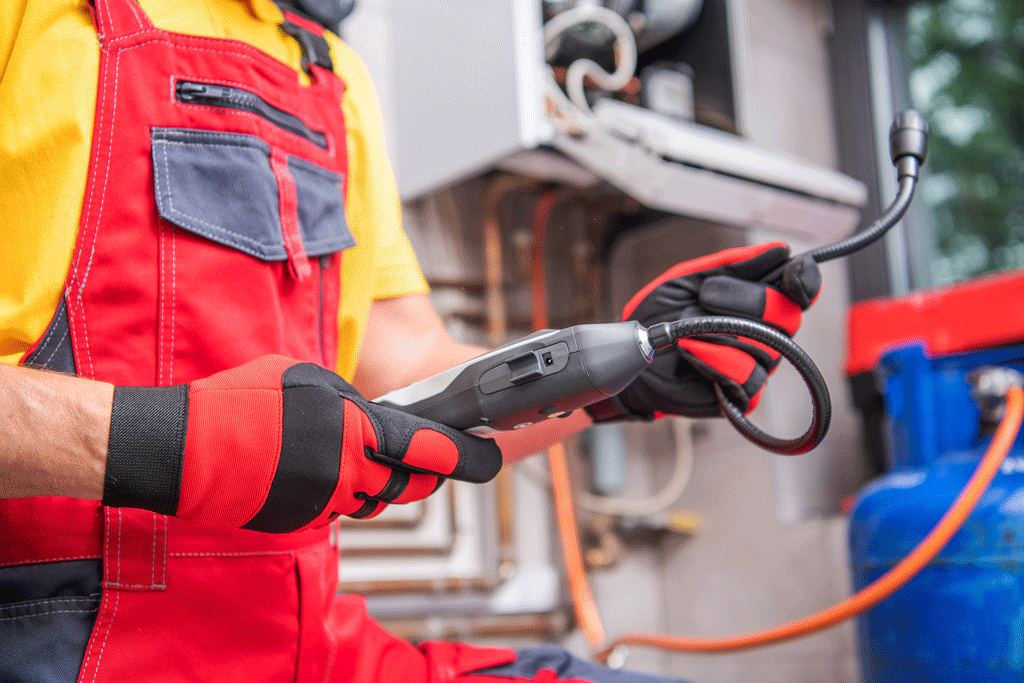
An air conditioning unit is conducive during summer with the scorching weather outside. Imagine getting home after a long morning of sweating under the scorching sun and entering your air-conditioned home.
Your air conditioner will give you shade from the harsh weather. However, one of the most prevalent questions to air conditioning service technicians during maintenance checks is whether using an air conditioning system during such weather is wise.
This article will show you the dos and don’ts of the air conditioning system to help you enjoy a relaxed time with your family without worry.
Can You Run Your AC During a Thunderstorm?
There are flashes of light, rain, and sometimes unbearable sound during a thunderstorm. However, only one poses a danger to electronic systems and appliances. Although lightning may seem attractive during heavy clouds, it can destroy your home’s electrical system and compromise the operation of your machines.
When lightning strikes your home and you experience a power outage, an electric charge is discharged into the environment and passes through your home to the ground. If your electrical system is not well protected, this charge carries a high current capacity, finding its way to operating systems.
Therefore, if your air conditioning system runs when lightning strikes, it could suffer some damage. Hence, turning off your air conditioning unit is best in a storm. Fortunately, the temperature and humidity of your home will fall during a storm; thus, you will still have some relief from the heat even without the air conditioner.
Why is it Not Advisable to Run an AC During a Thunderstorm?
The primary reason to switch off your air conditioning unit during a thunderstorm is due to potential lightning bolts. Although a lightning strike to your home is scarce, if it happens, its consequences are dire.
An air conditioning service provider will connect an electrical drop where your home connects to the electrical grid lines. In most cases, the electrical drop is a weak point for lightning strikes since, if it happens, it can cause a power surge to your home. This power surge is strong and can damage any operating system or appliance when it happens.
What are some of the AC Damages caused by Lightning Strikes?
When lightning strikes your home, it causes a power surge characterized by extreme heat and excess current flow in your system. After a lightning strike, the extra current and heat course through your electrical installation through the electric line, similar to electricity. Consequently, this excess current and heat find their way to your home’s electrical components melting them and rendering them useless.
Therefore, to regain the operation of the component, you must call an air conditioning service provider to repair the burnt parts or replace the entire system. Fortunately, since most technicians sufficiently insulate residential homes, the chances of an explosion or fire during a lightning strike are low.
In addition, there are protective devices that ensure your home is protected from fire from lightning strikes. Therefore, always ensure your home is well protected by installing the necessary electrical protective devices.
Can Lighting Strike Window AC Units?
When lightning strikes a home, it does so through its electrical system. Therefore, ductless mini-split air conditioning systems and window units face the same risks from lightning strikes.
However, the risk of lightning strikes on your window air conditioning unit increases in high apartment buildings. This is because lightning strikes the highest points. However, lighting strikes are rare for a window unit.
Therefore, plugging your window unit into the socket is usually safe but not running. Similar to HVAC units, when lightning strikes a window unit, it could either damage the circuit panel or melt the power port. Such damage usually needs a professional technician to repair or replace the damaged part.
How Can You Protect Your AC Unit?
The best way to ensure your family’s comfort is by taking the necessary measures to protect your air conditioning system. Apart from knowing when to use it or not, depending on the weather, it is also essential to have regular air conditioning service from a certified technician.
The technician will clean the system, change the filters, and repair parts before the air conditioner breakdown. In addition, a qualified technician replaces any worn-out parts before they start straining the system, which goes a long way to retaining the efficiency of your system.
The other important step you can take to protect your air conditioning system is installing electrical protection devices against lightning surges. Unfortunately, unlike what most homeowners believe, surge protectors do not provide enough protection to your unit against lightning bolts.
Therefore, it is best to incorporate additional protective devices such as ground rods, lightning rods, and conductors, especially if you live in an electrical storm-prone area. These devices will create an alternative path for the lightning to the ground, isolating your system from the dangers of lightning strikes.
Can I Run My AC During a Rainstorm?
Unlike a thunderstorm that causes lightning strikes, a rainstorm only includes showers and normal rain. Most air conditioning outdoor units can operate efficiently through a rainstorm with no danger of being damaged.
However, the only exception is in case of heavy rainfall that causes flooding. Since the outdoor unit is not designed to be immersed in water, turning off the AC when the water levels rise is advisable.
Additionally, do not stand in the water near the unit to avoid electrocution. After the rainwater drains, it is not advisable to use the unit. Instead, call a certified AC technician for an inspection. They will inspect the unit for any damages and fix them, leaving it operating efficiently.
Stay Safe and On Alert
Do you need an AC inspection service after a rainstorm or thunderstorm? Our technicians are available to check for and rectify damages. Contact us at Pitzer’s One Hour Air Conditioning & Heating of Mohave County today to book an appointment for your AC inspection.
See our most recent blog on this topic here.
Check out our customer reviews here.
Photo By mdesigner125 at iStock

The Most Important Questions to Ask an Air Conditioning Service Provider
No homeowner ever wants to seek the services of an air conditioning company. However, situations can arise, making these services a necessity. For instance, your air conditioning system can break down and fail to cool your house on a hot summer afternoon, rendering your house virtually uninhabitable.
Besides, for your air conditioning system to work efficiently, it has to be subjected to routine maintenance. Therefore, as long as you need an air conditioner to keep your house comfortably cool, will be required to call a professional air conditioning service at some point.
However, although there are many HVAC contractors near you, a lot of them are not competent and reliable enough to be trusted with something as valuable as your air conditioning system.
Therefore, if you are looking for an HVAC contractor to help you install, repair, or service your conditioning system, you need to do your due diligence to avoid settling for incompetent people. There are many things you can do to determine if a given HVAC contractor is good enough, but here are the most important questions you should ask in your assessment.
Are You Licensed?
HVAC contractors are regulated by local authorities. This is to protect the public from receiving substandard products and services that could needlessly cost a lot of money and end up hurting people physically.
Considering the complexity of modern HVAC systems, air conditioning service providers have to undergo years of training and acquire some experience before they can be allowed to offer their services legally. It is only after getting the unnecessary training and proving that they are competent that these professionals receive their licenses.
Although not every licensed HVAC contractor is good enough, every competent HVAC service provider must be licensed. Therefore, if you decide to hire an unlicensed HVAC contractor, you will risk receiving substandard services.
As such, before you can settle for a given HVAC contractor, you should ask them if they are duly licensed. If they seem unwilling or hesitant to show you their license, you should not risk trusting them with your HVAC equipment.
Are Your Insured?
Air conditioning jobs can be quite dangerous. Whether the job at hand involves installing, repairing, or servicing an air conditioning system, the risk of accidents cannot be overlooked. For instance, handling an air conditioning system could expose the person doing it to the risk of suffering electrical injuries.
Besides, exposure to Freon could lead to refrigerant poisoning, which is associated with symptoms like nausea, vomiting, headaches, seizures, fainting, and even death. A good air conditioning service should prepare for such risks by getting properly insured. Therefore, as you assess the suitability of a given HVAC contractor, it is important for you to ask them if they are insured.
If they are adequately insured, you will not have to worry about the financial burden of possible injuries since their insurance will cover them in the event of an accident. On the other hand, if you hire an uninsured HVAC contractor, you could end up getting held financially liable for the injuries they sustain while working in your house.
Therefore, if you have a reason to believe that a given HVAC contractor is not insured, you should not allow them to lay their hands on your air conditioning equipment.
How Long Have You Been In Business?
When shopping for a professional air conditioning company, experience is one of the most important factors to consider. This is because HVAC contractors seem to get better at what they do with experience, and therefore, the longer an HVAC service provider has been in the business, the more competent they are likely to be.
Besides, considering the level of competition in the HVAC industry, the only way an HVAC company can survive for many years is by offering high-quality services. Therefore, if an HVAC company has been around for many years, it means there is something they have been getting right.
On the other hand, if an HVAC company has not been around for more than a few years, it may be hard for you to find the information you need to objectively judge it based on its performance. Therefore, before you can choose to hire a given HVAC contractor, it is important for you to ask them about their experience. If they don’t have more than a few years of experience, you should not trust them with your air conditioning system.
Do You Offer Warranties?
Unfortunately, even if you choose an HVAC company with a solid track record and a glowing reputation, there is no guarantee that it will do a quality job. This is because even the most qualified people can make mistakes and consequently fail to meet your expectations.
Therefore, even after getting an HVAC issue addressed by a competent HVAC contractor, you might find yourself seeking the attention of a professional air conditioning service over the same issue a few days or weeks later.
The good news is that some HVAC companies protect their customers against suffering financial losses in such situations by offering warranties for the services offered. By giving you a warranty, they essentially accept to take financial responsibility should the issue at hand reoccur within a given time.
As such, before you can hire a particular HVAC contractor, it is important to ask them if you will get a warranty for the services offered. If the answer is negative, you should not risk hiring them.
The Bottom Line
Overall, it is apparent that before you can trust a given HVAC contractor with your air conditioning system, there are several questions you need to ask them for you to determine if they are competent and trustworthy. If you are looking for a dependable HVAC company to help you install, repair, or service your air conditioning system, Pitzer’s One Hour Air Conditioning & Heating of Mohave County is your best bet. Call us for more information about our company and services.
See our most recent blog on this topic here.
Photo By Lemon_tm at iStock

Understanding The Roles AC Vents; Why You Should Have an Air Conditioner Repair Professional Service Them Regularly
The most common questions about AC vents are what they are, where, and their purpose in the air conditioning unit. An AC vent is regarded as the most confusing part of AC systems.
While some might consider it dysfunctional and unimportant, air conditioner repair professionals testify that it is quite an essential part of any cooling system in a home or office.
More clarification about the AC vent is whether it should remain open or closed and the reason why. This article will provide the necessary answers so you can know how your AC vent works and how to operate it and explain everything there is to know about AC vents.
What Is an AC Vent?
In most cases, depending on how the AC unit is made, the AC vent is a duct running from the outside, which moves fresh air to your office or home through the AC system. In other cases, a tiny opening at the front and back of the AC unit regulates clean air from the outside to the purpose room.
What Is the Purpose of And AC Vent?
Regulate The Air Pressure
An AC system that functions correctly works by cooling hot air and heating cool air for interior air production. After the conditioned air is drawn in, the air in the room or space must be drawn out.
The AC vent is made to manage this primary objective, assisting the AC unit in drawing the interior air back and pushing it out. This process allows proper air pressure control in a home or office AC.
Maintain Air Quality And Remove Debris
Another fundamental purpose of the AC vent is to trap any debris and harmful impurities that contaminates the air drawn in, so if you don’t like contaminants in air, dirt, or dust, then the AC vent have you covered.
It is common for enclosed space to accumulate tiny and invisible particles in large amounts with time. When inhaled, these particles can threaten the health of the individuals in the area or room, including various respiratory attacks and allergies.
Therefore, the air conditioner repair experts recommend that the AC vents be well maintained and in complete working condition to regulate air from the inside and remove any impurities.
Improve The Performance Of The AC Unit And Reduce Costs
Well-installed AC vents, preferably in walls or ceilings, ensure the AC unit runs smoothly and efficiently.
Therefore, minimal air conditioner repair will be required, if at all. With well-installed AC vents and ducts, electricity cost is minimized because the system will run smoothly, reducing the requirement for more energy and higher power consumption to ensure fresh air production.
Closed or Open AC Vent and Why?
It is well to take note of your electricity bills to know whether there is a significant difference in keeping your AC vent open or closed, thereby having a proper cooling and heating cost.
However, AC vents should always remain open, as closing them will likely adversely affect your AC unit. A distinct design advantage is outlining the AC systems as per the target room or space in a home to be cooled.
While this ensures the efficient running of the unit, it also ensures that cooling or heating will occur in the room. A good design also ensures that the system is not overworking. As a result, closing the AC vents will negatively affect the system’s efficiency and thus is not advisable.
However, air conditioner repair professionals stress that the closure of the AC vents will not likely translate to cost savings. The preferable choice to minimize power consumption is to maintain the temperature in your home at a sustained temperature and have regular system maintenance and servicing done.
Effect of Damaged or Blocked AC Vents
There is a close comparison of the AC vents to human respiration: if you block your nose, air will not go to the lungs, eventually leading to choking or suffocation.
Similarly, when you choke the AC vent, the air is not entirely shut off as the system will likely still push through the blocked vent, but due to constant suppression of air, there will be an increase in air pressure and a reduction in sufficient airflow. Combining these elements will lead to a damaged AC system as time progresses.
A leaky ductwork could release carbon monoxide by the damaged AC system, which is not human-friendly and can cause health problems.
Due to the destruction caused by the problem, the AC will require more power, which constitutes a higher energy cost. With this reference, since your AC vents are bound to become dirty and clogged over time, they should be checked and well-serviced.
How to Find Out Blocked AC Vents
Even with regular maintenance, AC vents are still bound to block, especially if the surrounding environment has dirt particles that wind can quickly move.
The easiest way to determine if the AC vent is blocked is inconsistent temperatures in the entire house or office the AC system is intended for. It is advisable to distinguish if it’s the whole AC system that is not working or whether it’s the AC vent that is clogged.
An efficient way to test whether the AC vent is clogged is by switching on the AC unit, and after the fan is started, airflow is checked in each room to determine any significant blockage. The air filter should be checked for a detectable clog since if it is clogged, airflow will be affected in the whole system.
Ensure AC Vents Are Clean and Always Open
AC vent systems are vital in any AC unit. A failed ventilation system will lead to a failed regulatory system. Are you in doubt? Contact us at Pitzer’s One Hour Air Conditioning & Heating of Mohave County for an inspection, diagnosis, and maintenance that will leave your vents clean and properly working.
See our most recent blog on this topic here
Photo By Serenethos at iStock

Three Main Factors That Greatly Determine How Long It Will Take to Complete Air Conditioner Installation
Are you looking to replace your old system or install a new one for your new home? Regardless of why you are searching for an HVAC system, the most important thing is to engage a certified air conditioner installation professional to guide you through your search since a technician is better suited to advise on the best systems in the market.
However, consider your chosen system’s cost and energy efficiency during this process. With the right equipment and expert guidance, you are guaranteed a heating and cooling system that will efficiently serve your home’s temperature needs leaving your family comfortable.
However, to enjoy all the features that an ideal heating, ventilation, and air conditioning system offers, a well-equipped and skilled AC technician must do the installation process.
HVAC Installation Process
When buying a new HVAC system, it is essential to have already contacted the technician who will perform the installation and schedule the time of installation. In addition, it is best to be in your compound when the installation of your heating and cooling unit is ongoing for two main reasons.
One, it is so that you can facilitate easy access to the needed areas, such as the outdoor where the outdoor unit will be installed and places such as the main electrical box. Second, being on-site during your air conditioning system installation is the best time to ask the installation technician every question about your HVAC system.
Therefore, this is when you should ask about the system’s operation, schedule regular maintenance and know the dos and don’ts of the system. In addition, the technician can also brief you on the warning signs that your HVAC system might indicate when something is wrong. All these questions will help you keep your HVAC system at optimum performance and extend its life span.
HVAC Installation Time
The main question that most homeowners ask when planning to stay to install their HVAC system is the time it takes to install an HVAC system.
Unfortunately, this question has no straight answer since HVAC installation times differ from one case to the next. This is because the installation time of an HVAC system is affected by factors such as the type of the system being installed, your home’s size, and whether there is a pre-existing system.
Therefore, discuss how much time to allocate to your HVAC system’s installation with your air conditioner installation technicians. The technician will assess your home, the HVAC system, and all other relevant factors that impact the time it will take to install the system and offer you a concrete answer.
However, most HVAC system installations only last for less than a day. But, if the installation requires additional services, such as removing or replacing an old HVAC system, the process can take up to three days. The below points will help you better understand how the various factors affect the installation process.
Your Home’s Size
The size of your home is an impactful factor when installing your HVAC system and a significant reason why you should hire an air conditioner installation professional to install the system.
The system you choose needs to be of the right size to cover the temperature needs of your home efficiently. If it is too small, the high-temperature requirements will strain the system and have It running throughout as it tries to meet the demand.
If the system is too large, it will lead to more energy consumption resulting in high energy bills. A skilled technician will help you avoid these instances by suggesting the ideal system.
If you have an extensive home, installing a new HVAC system will take longer than when the house is smaller. Additionally, a large home might require the technician to install several HVAC units, ultimately taking longer.
However, only some HVAC installations take longer in massive homes. The process might take a shorter time, depending on the nature of the installation. There are instances where the installation will take the same time for a big house as for a small one.
Nature of the Installation
Since every home is unique in structure, temperature needs, and homeowners’ preferences, all HVAC installations are unique. Keeping that in mind, there are two major types of installations full replacements and changeouts.
Your home’s HVAC system consists of more than one air conditioning unit. It has parts such as ductwork and indoor and outdoor units, which also house different components. Therefore, during a full replacement, the technician changes the entire system from the ductwork to the cooling unit.
Since it is a complete uprooting and replacing the existing system with a new one, this installation takes time and lasts longer. Conversely, a changeout installation involves replacing the old pre-existing HVAC unit but keeping the other equipment. This installation time is less tasking and thus takes a short time compared to its counterpart.
The Layout of Your Home
The other significant factor in the time an HVAC installation takes is the structural layout of your home.
Although the footage size of your home contributes to the amount of time an installation technician takes, it is only sometimes impactful. Sometimes, the layout of your home plays a more significant role.
For instance, if your home’s layout prevents the installation technician from accessing fundamental areas such as the electrical system, the installation of your new system will take longer, regardless of the size of your home. This is because the air conditioner installation expert must first find a way to access these parts.
Plan Well Ahead Of AC Installation
When installing a new heating and cooling system in your home, it is essential to know the installation time required. Do you need a new AC installation or to replace your old one? Contact us at Pitzer’s One Hour Air Conditioning & Heating of Mohave County today for professional and swift service.
See our most recent blog on this topic here
Photo By bancha singchai at iStock

Signs, Causes, and Risks of AC Gas Leakage and How Your Air Conditioning Service Professional Can Help
Air conditioning units integrate various gases and chemicals to refresh your home effectively. While the chemicals are important, they can be hazardous and sometimes life-threatening.
Therefore, there is a need for care while doing away with them. When a gas leak occurs in your system, it will not work as it should, no matter if the settings are done manually on the thermostat.
Therefore, it takes some effort for an air conditioning service technician to go inside your unit since, as viewed from the outside, the interior mechanics are working fine. Therefore, this article will focus on what gas leaks are, what occurs during a gas leak, and the dangers associated.
Can You Smell the Gas?
The first step in understanding gas leaks is outlining if you can identify the smell of leaking gas. The most basic way of determining a leak is by smelling the gas. The pungent smell of gas is hard to miss.
It is a smell that can be toxic and falls between the scent of candy and chloroform. Therefore, immediately contact an air conditioning service technician if you smell or suspect a gas leak. The technician will investigate the gas leak and lay down countermeasures for solving the problem harmlessly and competently.
What Happens When There Is a Gas Leak?
During a gas leak, the coolant in your air conditioning unit will turn into toxins. These toxins can be lethal since the gas has not undergone the normal flow of air cleansing. Therefore, they are deadly and will likely cause nausea and asphyxiation.
Moreover, notable side effects of gas leakage, like skin irritation, dry eyes, increased heart rate, and dehydration, can be life-threatening in prolonged exposure.
Noteworthy Causes of Air Conditioning Gas Leaks
Mechanically Damaged Refrigerant Lines
Air conditioning in your AC unit occurs when refrigerant gas passes between the indoor evaporator and outdoor condenser coils.
The gas moves along the refrigerant lines, which are made of copper for a light construction of the unit and easy conductivity.
Therefore, these copper lines move the refrigerant between the condenser and the evaporator, regulating the air depending on the thermostat setting. When these lines experience mechanical damage, the air conditioner will likely leak.
Leaky Control Valve Connections
Cleaning the control valves correctly and making sure they are well-fitted will help avoid the leaking lines around these control valves. Joints, terminations, and connections get dirty and sometimes rusty as the gases react with the copper line, becoming the main weakness in the unit.
Corrosion
Corrosion is one of the significant factors that affect the well-being of most gas lines. It contributes to reduced strength of gas pipes and reduced width of heavy walls. Notably, gas tends to react with surrounding metals and even natural air.
Reactive atoms found in fluorides and chlorides react with the coil, resulting in gas leakage in the refrigerant lines. Continuous exposure to the acids in cleaning agents is also a significant cause of corrosion.
Poorly Fabricated Joints And Fitting Controls
When there are many joints to be fitted, some are likely to be imperfect. This is mainly caused by soldering work that does not melt uniformly, joints disturbed before they dry up, and cold and overheated fittings, all lead to an imperfect joint.
These soldering problems create weaknesses in the air conditioning unit, which generate or increase the chances of a gas leak in the system.
Defective Schrader Valve
Schrader valves have easily damaged seals. Therefore, when damaged, they result in gas leakage in the AC unit. In addition, this valve can cause other refrigerant gas issues which require an air conditioning service technician to expose.
Dangers related to Air Conditioning Gas Leakage
Gas leakage from your air conditioning system can lead to various hazardous effects. Since the chemicals and gases in the unit are not health-friendly, they typically have to undergo the required process to cleanse them.
Notably, breathing these gases for an extended period can harm your family’s health. Additionally, their exposure to the environment can cause result in property damage. Some of the dangers related to air conditioning gas leakage include;
Health Effects
Toxic gases can harm human bodies when exposed to them for long periods. The body can absorb them through the skin or eyes.
Extended exposure to gas leaks can cause damage to your body cells, tissues, and nervous system, leading to serious illness or even death.
Notably, different toxic gases can build up rapidly in enclosed spaces. Although the common symptoms of AC gas leakage are nausea and headaches, short-term exposure to these gases can also cause dry skin, poor coordination, convulsions, and restlessness.
In contrast, long-term exposure can cause skin cancer, asphyxiation, inability to breathe, and unconsciousness. In extreme situations, if someone inhales freon, the highly poisonous gas will most likely lead to death as it is toxic and fatal. Therefore, immediately contact a professional air conditioning service technician in case of a freon gas leak.
Material Damage
The other notable impact of AC gas leakage is the escalation of energy usage in your home, resulting in high monthly electrical bills.
Apart from the expense of running a leaking AC unit, prolonged leakage exerts a lot of pressure on the compressor, which ends up breaking. Extended usage of a leaking AC system causes the unit to work harder, reducing the system’s efficiency. Eventually, the inefficient operation of your system will cause the compressor to break.
This necessitates high repair costs, higher than fixing the gas leak. Leaks also carry potential damage to other life forms. Chlorofluorocarbons should be disposed of properly since inappropriate disposal harmfully affects animals and plants due to their water dependency.
For your AC unit to run smoothly, it should be well maintained with regular professional checks. Do you smell AC gas odors? Contact us at Pitzer’s One Hour Air Conditioning & Heating of Mohave County for a professional inspection and repair.
See our most recent blog on this topic here.
Photo By welcomia at iStock






